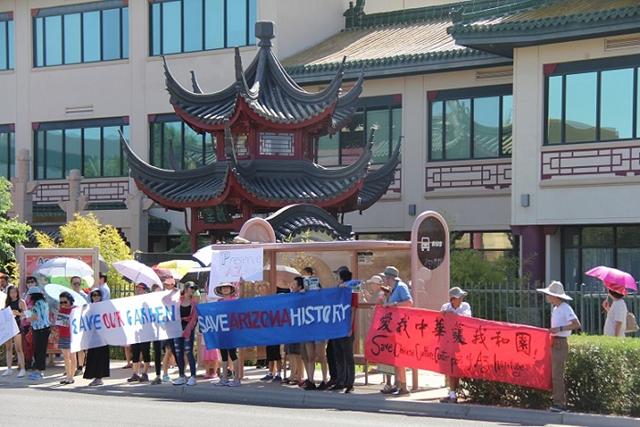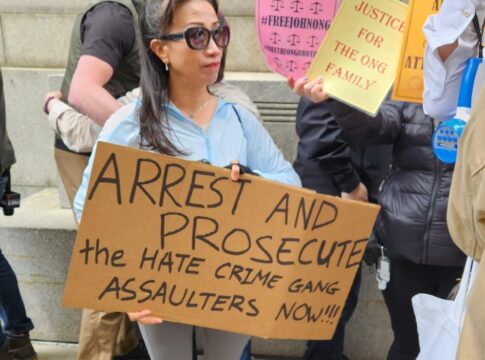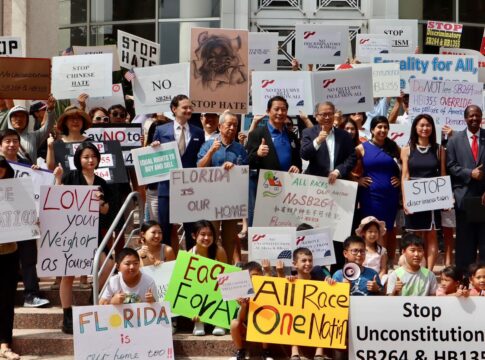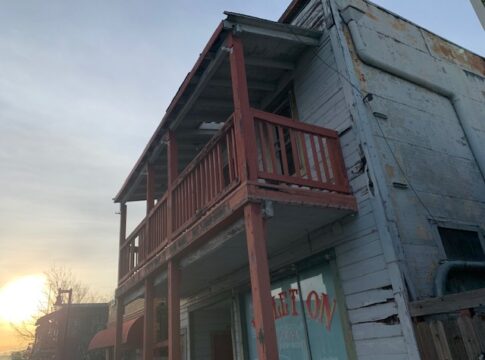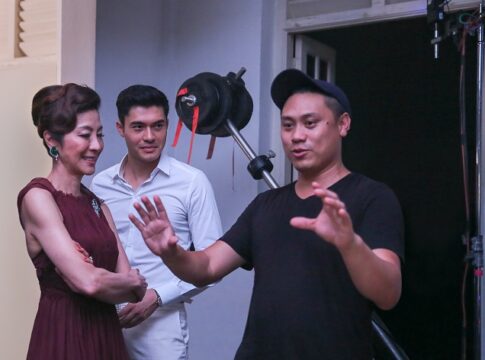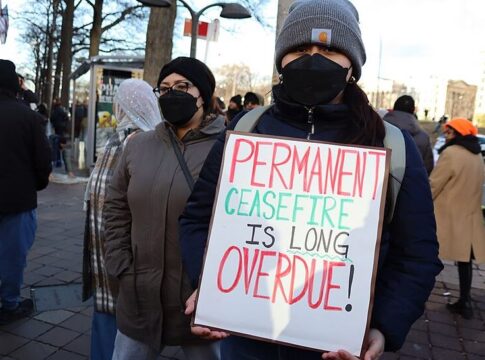By Gabi Wy
AsAmNews Intern
When Elizabeth Mann served as developer for the Phoenix Chinese Cultural Center in 1997, painstakingly recruiting the best of the best from China to build the center, she never imagined anyone would want to tear it down.
However, new company and building owner True North made clear its intentions to turn the building into a generic office park several months ago, renovating and relocating Chinese artifacts.
“It was a shock,” Mann said. “It’s unbelievable. There’s more and more need for cultural diversity as every city is trying to add more cultural elements to make the United States really a melting pot. For the city of Phoenix and (True North) to announce the plan to demolish the cultural center, that’s a shock.”
LATEST STORIES
Mann owned and managed BNU, a Chinese company that worked with the city of Phoenix and the U.S. Embassy in China to build the cultural center in an ever-growing city. The company first sold it in 2016 to a New York company, who then sold it to True North.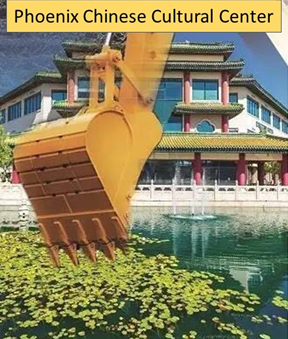
When True North purchased the building for more than $10 million in June of 2017, Mann said the community didn’t think much about the new ownership until the company went to the city of Phoenix with plans to renovate the building.
She said immediately in July, True North announced every Chinese element would be destroyed or thrown away if the community didn’t come and pick up the pieces.
“People started protesting and wanting to save (the center,)” Mann said. “Whoever proposed this renovation has a lack of cultural awareness and is ignorant.”
True North blocked off the community’s access to the garden with a fence, sparking protests and inspiring people to attend city council meetings to voice their disapproval.
Jason Rose, spokesman for True North, said the fence was put up because of construction and is a temporary blockage. He said while True North is renovating the building, the garden will be preserved.
“We are taking extraordinary efforts to preserve elements onsite and offsite,” Rose said. “There’s construction activity on site. If (True North) wouldn’t have put up the fence, there would be damage to the garden these people are trying to save. It’s ‘damned if you do, damned if you don’t.”
He said the company is baffled by the reaction to the fence.
“They’ve maintained egregious and wrongful protesting,” he said. “The fence is temporary by nature. All of this will be done before six months are up. There was concern expressed when we had direct dialogue with the Chinese community about vandalism and confiscation of elements in the garden. That’s why the fence is there.”
The primary reason the cultural center can’t be relocated or rebuilt is the craftsmanship that went into the project in 1997—it no longer exists.
The traditional Chinese methods used to construct the building are designated by the United Nations as intangible assets by the United Nations. The masters recruited from China through the U.S. Embassy in 1997 are no longer living, and the original architect is more than 80 years old, Mann said.
“The skill is pretty much lost,” she said. “You break all the pieces, and then you don’t have the master to put it back together. You may be able to glue them, but it will never be the same.”
Not only would the traditional architecture be destroyed, but the Chinese communities right to religious expression is threatened by the building’s demolition.
“One things Americans probably do not know is that Chinese practice of religion isn’t the same as American,” Mann said. “Chinese don’t go to church. They practice inner strength and self-enlightenment. Because of that, religion is inseparable.”
Mann states the Chinese community, whether Buddhist, Daoist or Confucianist, uses the cultural center’s garden to worship.
“To eliminate someone’s sacred place so lightly is so inconsiderate,” she said.
Rose said while the Chinese American community has made offers to purchase the center, True North said it couldn’t accept because it didn’t seem like the community could follow through.
“They’ve made two offers, but with respect, they’ve been terribly hollow,” he said. “One was for $10.5 million, and then for $13 million… those are lowball offers, and they will not meet them. The deposit of $10,000 is all they wanted to put down. That certainly suggests there’s not the financial wherewithal to do it.”
Rose cited the company’s press release September 12, which states True North will work to preserve the garden, twelve artifacts including the roof (with relocation) and the Welcome Gate (with relocation). The company also mentioned Hance Park as a possible relocation for the cultural center.
“We have offered significant preservation and offered the parameters for reasonable purchase,” Rose said. “To date, none of that has been advantaged.”
He said because True North has made these efforts, the community’s reaction is unwarranted.
“I don’t mean to be disrespectful at all, but we’re unaware that the garden was used in the past for religious purposes,” Rose said. “At the end of the day, and I say this with the utmost respect, it’s private property, not a house of worship.”
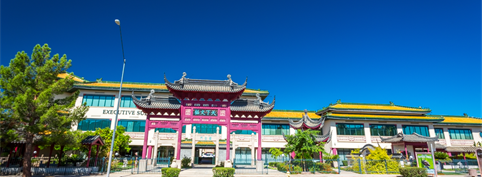
True North’s argument in court for renovation centers around two points: the center is not economically successful, and it’s the company’s right to do what it wants with the property it owns.
Mann argues when she was managing the center, it was incredibly successful and an economic benefit for the city of Phoenix.
“Only recently, the center doesn’t want to lease to Chinese tenants,” she said. “There’s always a way to revive a place, not tear it down. Being human, it’s so easy to destroy something, but it takes so much time and history to rebuild it.”
Mann said the center never asked for money for people to utilize the building.
“We never took donations from the public in the beginning,” she said. “We made a promise that this would be built to last.”
Since True North announced its intentions in July, there have been four lawsuits regarding the subject filed by different parties.
The first was by the Chinese restaurant located at the cultural center. The judge in that instance told True North it could at least temporarily not make any alterations to the center pending the outcome of the case.
Attorney Jonathan Frutkin of Radix Law said they went to federal court asking to require the fencing to come down and Chinese Americans be able to pray in the garden while the lawsuit continued, but the judge in that case said the previous prevention of alterations was sufficient and the fence remained up.
“To destroy this prayer garden in the way that they’re talking about is the functional equivalent of someone going into a church and saying, ‘We’re only going to rip out the stained glass windows, the pews, and we’ll move the cross over to the side,’” Frutkin said. “That is what is happening to them. The pain is real.”
However, Rose stated True North would not be destroying the garden.
“Once revitalization is done and the fence is removed, we are keeping the garden open for whoever to use it,” he said. “The property owner is under no obligation to do this. We are going to preserve some of these elements despite the insidious things (the community) has done. We’re opening it up for purchase that’s reasonable. Purchase, don’t protest. You can’t protest to bend the law any more.”
Several weeks ago, Radix Law filed a federal lawsuit on behalf of the Arizona Foundation for Chinese Rights and 10 individual plaintiffs. The lawsuit says True North is violating the Civil Rights Act and an act against religious zones being trampled.
The injunction stands until the hearing in November. Frutkin said he’s hopeful the court will see the value in preserving the property, while Rose said he foresees the court deciding on the behalf of private property owners’ rights.
“The people who have showed up to protest and become involved in city meetings the last two months has been surprising, especially for a city where the Chinese American population isn’t as significant as it is in other cities,” Frutkin said. “It’s expanded from a very core group of Chinese people to a larger, civic-minded group of people with all backgrounds. It really does matter to people.”
AsAmNews has Asian America in its heart. We’re an all-volunteer effort of dedicated staff and interns. You can show your support by liking our Facebook page at www.facebook.com/asamnews, following us on Twitter, sharing our stories, interning or joining our staff.


